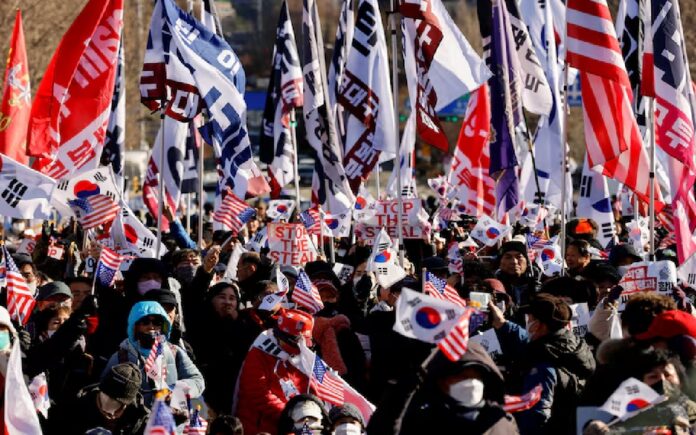Seoul: South Korea’s detained President Yoon Suk Yeol has decided not to participate in a second day of questioning, his lawyer stated on Thursday. This development marks a further standoff in the ongoing criminal investigation into whether Yoon attempted insurrection with his controversial martial law bid.
Yoon, the first sitting South Korean president to be arrested, was taken to the Seoul Detention Centre on Wednesday evening after refusing to cooperate with authorities. He reportedly spent the night in a solitary cell. Under South Korean law, investigators have 48 hours to interrogate him before they must either release him or seek a warrant to extend his detention for up to 20 days.
Political Crisis Deepens
This political crisis, considered South Korea’s worst in decades, stems from Yoon’s brief attempt to impose martial law on December 3, a move that was swiftly overturned by parliament. His arrest has further intensified tensions, as the Constitutional Court prepares for a second hearing in Yoon’s impeachment trial. The court will decide whether to permanently remove him or reinstate his presidential powers.
Yoon’s arrest on Wednesday came after weeks of resistance. Police launched a pre-dawn raid on his fortified villa in Seoul, sparking despair among his loyal followers who had gathered at the site. Explaining his decision to surrender, Yoon stated he did so to prevent “unsavoury bloodshed,” but he continues to denounce the investigation as illegal and the arrest warrant as invalid.
Refusal to Cooperate
Authorities from the Corruption Investigation Office for High-ranking Officials (CIO), which is leading the inquiry, revealed that Yoon has refused to engage with investigators, who had prepared a questionnaire spanning over 200 pages. Despite repeated attempts, he has not responded to their questions.
His next questioning session was scheduled for Thursday at 2 p.m. (0500 GMT). However, Yoon Kab-keun, one of his lawyers, confirmed via a text message to reporters that Yoon would not attend. According to Yonhap, the lawyer cited health reasons and described further questioning as futile, though no additional details were provided.
Also Read | Japan’s Aging Workforce Sparks Widespread Labor Crisis
CIO officials are exploring the possibility of forcibly bringing Yoon in for questioning but are reviewing the relevant legal provisions before proceeding. Meanwhile, a small group of Yoon’s supporters staged a protest outside the CIO office, decrying the arrest as illegitimate.
Legal Challenges and Economic Impact
Yoon’s legal team has challenged the validity of the arrest warrant, arguing it was issued by a court lacking proper jurisdiction and that the investigation team had no legal mandate. The lawyers have also filed a court appeal to review the legality of his detention.
The suspended president faces allegations of masterminding insurrection, a grave charge in South Korea that carries potential penalties of life imprisonment or even the death penalty. Yoon’s arrest period of 48 hours has been temporarily paused while the court reviews the legalities, according to the CIO.
Also Read | Putin’s Stance on Ukraine: Neutrality, No NATO, and Limited Military
The Constitutional Court’s decision on Yoon’s impeachment remains a focal point. Public opinion polls indicate that a majority of South Koreans support impeachment. However, the arrest appears to have galvanized his core supporters.
This political turmoil has reverberated across Asia’s fourth-largest economy. On Thursday, South Korea’s central bank unexpectedly kept its policy interest rate unchanged, opting to stabilize the won, which has recently fallen to a 15-year low against the U.S. dollar. Analysts had widely anticipated a rate cut, but the ongoing crisis has added uncertainty to the economic outlook.



